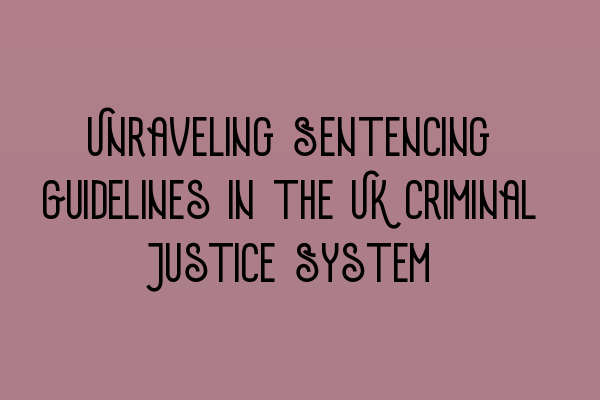Unraveling Sentencing Guidelines in the UK Criminal Justice System
When it comes to understanding the intricacies of sentencing guidelines in the UK criminal justice system, it can often feel like unraveling a complex puzzle. However, with the right knowledge and guidance, you can navigate this maze with confidence. In this blog post, we will delve into the key aspects of sentencing guidelines, shedding light on their importance and how they impact the criminal justice process.
Understanding Sentencing Guidelines
Sentencing guidelines play a vital role in ensuring consistency and fairness in criminal sentencing. These guidelines provide a framework for judges and magistrates to determine appropriate sentences for various criminal offenses by taking into account several factors such as the severity of the offense, the defendant’s criminal history, and any aggravating or mitigating circumstances.
By providing guidelines, the criminal justice system aims to ensure that similar offenses are met with similar penalties, promoting both fairness and transparency. Sentencing guidelines mitigate the risk of arbitrary or inconsistent sentencing, ensuring that justice is served and public confidence is maintained.
It is important to note that sentencing guidelines are not strict rules, but rather general principles that allow for judicial discretion. Judges and magistrates have the power to deviate from the recommended guidelines if they deem it necessary based on the specific circumstances of the case. This flexibility ensures that each case is evaluated on its individual merits.
Sentencing Process in the UK Criminal Justice System
The sentencing process in the UK criminal justice system involves several stages. Once a defendant is found guilty or pleads guilty to a criminal offense, the court proceeds to the sentencing phase.
During the sentencing phase, the court considers a range of factors, including the seriousness of the offense, the defendant’s culpability, the impact on the victim, and any mitigating or aggravating circumstances. The court’s main objective is to determine a sentence that is proportionate to the crime committed.
When assessing the appropriate sentence, judges and magistrates refer to the relevant sentencing guidelines. These guidelines outline the starting point and the range of sentences for different offenses, taking into account the harm caused, the level of premeditation, the defendant’s level of remorse, and previous convictions, among other factors.
It is worth noting that sentencing guidelines are regularly updated to reflect changes in societal attitudes, government policies, and legal precedents. Staying up to date with the latest guidelines is crucial for legal professionals to provide accurate advice and ensure fair representation for their clients.
The Role of Legal Professionals
Legal professionals, such as solicitors and barristers, play a crucial role in guiding clients through the complexities of the sentencing process. They have a deep understanding of the sentencing guidelines and can provide invaluable advice on the potential outcomes and options available.
As a solicitor at SQE Criminal Law & Practice Law UK, I have extensive experience in handling criminal cases and navigating the sentencing process. Our team of dedicated solicitors is committed to providing comprehensive legal assistance, ensuring that our clients’ rights are upheld and advocating for the most favorable outcome.
If you are preparing for the SQE 1 or SQE 2 exams or require assistance with criminal law cases, SQE Criminal Law & Practice Law UK offers a range of preparation courses and resources to help you succeed. We provide SQE 1 practice exam questions and SQE 1 practice mocks FLK1 and FLK2 to familiarize aspiring solicitors with the examination format and content.
SQE 2 preparation courses are also available to equip you with the knowledge and skills needed to excel in your legal career. Our courses are designed by industry experts and are tailored to meet the requirements of the SQE examinations.
For more information on SQE exam dates, you can refer to our article on SRA SQE Exam Dates. We understand the importance of being well-prepared and offer comprehensive resources to support your success.
Conclusion
Sentencing guidelines play a pivotal role in the UK criminal justice system, ensuring fairness and consistency in the sentencing process. By providing a framework for judges and magistrates, these guidelines promote transparency and uphold public confidence in the justice system.
As legal professionals, it is crucial to have a thorough understanding of sentencing guidelines to effectively represent clients and provide accurate advice. At SQE Criminal Law & Practice Law UK, we are committed to supporting aspiring solicitors and legal professionals in their journey towards success.
If you are looking to excel in your SQE exams or require assistance with criminal law cases, our team of experienced solicitors is here to help. Explore our SQE 1 and SQE 2 preparation courses, practice exams, and mocks to enhance your knowledge and improve your chances of success.
